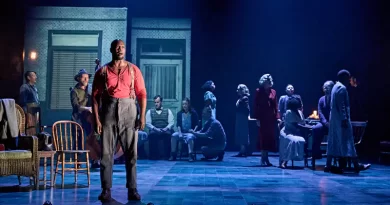“Macbeth” at Southwark Playhouse Borough
Tom Bolton in south London
18 March 2023
It is an unusual Macbeth that comes to life with the Porter’s scene, the play’s disconcerting post-murder comic interlude – even more so when it is performed without words. Dale Wylde’s mimed scene is a weird and captivating interlude. It encapsulates the strengths and weaknesses of Flabbergast Theatre’s version, which is a powerful physical spectacle, but frequently seems encumbered by the play’s text, which gets in the way of the performers’ urge to express themselves. The company is on stage throughout, dressed in braces and sackcloth kilts and daubed with mud. As the audience arrives, they are already moving as a group, twisting and grasping at things in the air around them. This haunted atmosphere defines the show. The performers generate a powerful physical presence, driven by their commitment to a form of theatrical expression rarely seen from a British company.

Vyte Garriga, Simon Gleave, Henry Maynard.
Photo credit: Michael Lynch.
Flabbergast Theatre was set up by Henry Maynard, who directs and designs Macbeth, as well as playing the title role. At the first opportunity after lockdown, in 2020, the new collective lit out for the Grotowski Institute in Poland to work with performer Matej Matejka, who then joined them as movement director on Macbeth. The togetherness and collective purpose that came from this process is obvious. It is exciting to see such a bold, expressive, and startling interpretation, entirely unlike the standard English Shakespearean production. It is visceral, animalistic, and strange. However, the approach has some significant downsides, and the main victims are the text and the nuances of the play.
The performers tend to play their parts with exaggerated vocal mannerisms, accompanied by bold physical expression. This creates types rather than individuals with, for example, Daniel Chrisostomou’s Duncan a Père Ubu-style grotesque. Yet Macbeth does not lend itself to this approach. Despite its all-action surface, the play is full of intuition, off-stage disasters, unspoken thoughts, and social awkwardness. These subtleties are absent from Flabbergast’s version, and it is often difficult to hear what is being said. Emotions are signalled in to reinforce what the text says, including Briony O’Callaghan’s Lady Macbeth dragging her husband by the hair to help screw his courage to the sticking post, and Maynard having an epileptic seizure when confronted with the Witches’ prophecy. The company’s approach delivers impressive energy but not clarity and, without prior knowledge of the play, it would be difficult to follow what is happening on stage.

Daniel Chrisostomou, Paulina Krzeczkowska and Dale Wylde.
Photo credit: Michael Lynch.
Adam Clifford’s music is a key driver of the play’s atmosphere. Four drums at the rear of the stage, beaten simultaneously, create propulsive ritual rhythms. The cast prowl the stage brandishing staves, which they pound on the stage, especially effective during battle scenes, and hand chimes which sound eerie notes. The ritual element is strong, and much of the play feels like a whirlpool of fate, from which none of the characters will emerge. Interestingly, this includes Malcolm whose crowning by the Witches at the play’s end is an ominous moment, a reminder that we already know his children will not succeed to the throne.
Flabbergast’s strengths are movement and spectacle, and there are memorable scenes throughout. The Macbeths lie on a vertical bed, held up by Witches and spirits whose gurning faces frame the couple. The cast moves as a single snorting, menacing cluster to send Banquo on his fatal horse ride, and lurches across the stage in unison, staves akimbo, like a cohort of samurai, as the armies advance on one another. However, the decision to include the tricky scene in which Malcolm tests Macduff by declaring himself unfit to be king shows us what is missing. Sometimes cut from the play, it is tough to make the dialogue credible, but here it is played straight and, counter-intuitively, it is a moment of clarity and relief. Suddenly, the audience is absorbed in the dialogue but, when another character enters, the performance style reverts and the atmosphere dissipates.
It is tempting to think that Maynard could have achieved what he wanted by ditching much more of the script. Flabbergast’s style is exciting and, in many ways, what our text-constrained theatre needs. The company’s ambition is admirable, but Macbeth, at least in this form, is not an ideal vehicle for their skills. Perhaps it is a staging-post, en route to the fully free physical expression that these performers are clearly well equipped to deliver?









